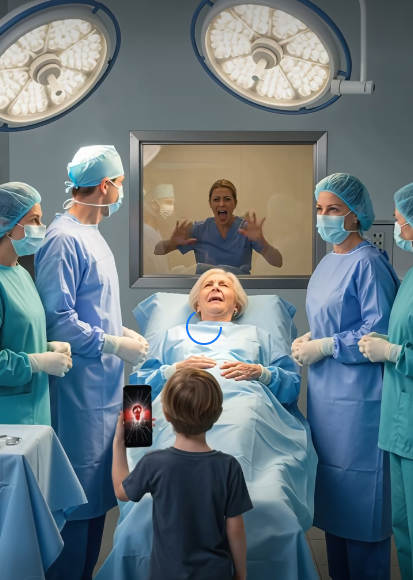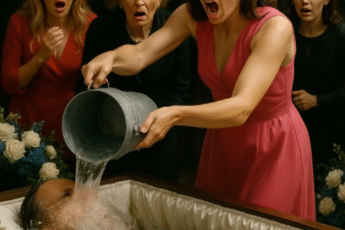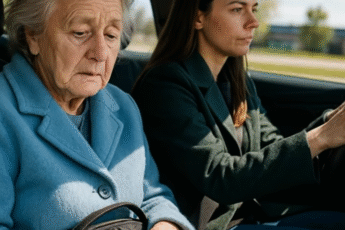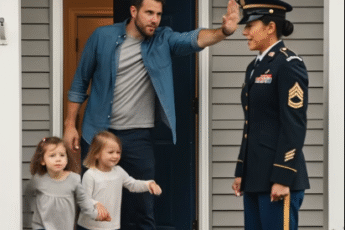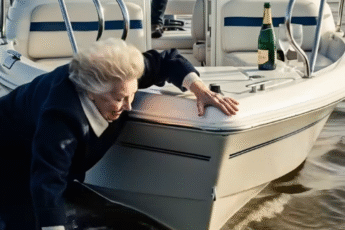The operating room was colder than I had ever imagined. I lay on the narrow table, the bright surgical lights a constellation of sterile suns, the steady beeping of the heart monitor a metronome counting down the seconds I had left to make a choice. On a tray near the nurse sat a clipboard with my signature, a testament to the fact that I had agreed to give my kidney to my oldest son, Caleb. Everyone told me I was his only chance.
Through the glass window of the observation room stood my daughter-in-law, Aubrey, her arms folded tightly, her eyes fixed on me with a sharpness that cut deeper than any scalpel. Next to her were her parents, Victor and Elaine, nodding as if this moment was a victory they had already claimed.
Dr. Aaron Whitfield, the surgeon, gave a calm nod to his team. The anesthesia syringe gleamed. Just as the nurse stepped forward, the door burst open.
A gust of hallway air rattled the trays of instruments. My nine-year-old grandson, Theo, stumbled inside, his chest heaving as though he had run the entire length of the hospital. Clutched in his small hand was an old cell phone with a cracked screen.
“Grandma!” Theo’s voice, trembling but clear, echoed in the frozen room. “I have to tell the truth about why Dad really needs your kidney!”
Silence. So complete the heart monitor’s beeps sounded like thunder. A doctor dropped a pair of forceps. Aubrey slammed her palms against the glass. “Do not listen to him!” she screamed.
But Theo looked straight at me, his eyes filled with a fear and determination that seemed too large for his small body. The truth of our family was about to be laid bare under the unforgiving glare of the surgical lights.
My name is Lorraine Parker. I am sixty-seven years old, and for most of my life, I worked in a school cafeteria. I know the rhythm of working hard until my legs ache. Now my days are quieter, spent in a small bungalow with my husband, Frank, who has been in a wheelchair since a stroke ten years ago. I raised two sons under this roof. Caleb, my oldest, was always the strong one, with a laugh that filled a room. Mason, my younger son, is quieter, a plumber who fixes what is broken without fuss.
When Caleb brought Aubrey home, I tried to welcome her. She was polished, well-spoken, and seemed devoted to him. I couldn’t have guessed how quickly that perfect picture would crack.
The first time I heard the words “kidney transplant,” I felt my knees weaken. Caleb’s kidneys were failing. Time was running out. One evening, Aubrey arrived at my house carrying a thick folder of medical reports. She spread them across my dining table like battle plans.
“You are the only compatible match,” she said, her voice calm but sharp, leaving no space for hesitation. “This isn’t just an option. It is your duty as his mother.”
Her parents, Victor and Elaine, soon followed, their words like heavy stones. “A mother’s sacrifice is the highest act of love,” Victor declared. Elaine’s eyes narrowed. “Everyone will know if you refuse. They will say you let your son suffer.”
Caleb, too weak to stand, whispered from the couch, “Mom, I trust you. I know you’ll save me.”
At that moment, it no longer felt like a choice. It felt like an order.
In the weeks that followed, a knot of unease began to form inside me. The first red flag came on a quiet afternoon at the hospital. I walked in and saw Aubrey drop a small, unlabeled pill into Caleb’s glass of water. When she noticed me, she smiled too quickly. “Just a vitamin,” she said, but her hands were tight around the cup.
Later, I asked Caleb’s doctor if any new supplements had been prescribed. He flipped through the chart. “No changes,” he said. My stomach sank.
At home, I found a white plastic bottle with no label tucked under a napkin on the nightstand, filled with blue pills. I overheard Aubrey’s late-night phone calls, her voice a low, hurried whisper. “Don’t worry,” she said one night. “Everything is on track.”
I told myself stress was making me suspicious. Yet each detail clung to me like a thorn I could not pull free.
Theo, my grandson, saw more than most. He was usually a whirlwind of laughter, but lately, he had grown quiet. One afternoon, as I chopped vegetables, he looked up from his toy cars. “Grandma,” he asked, his voice soft, “what if someone makes another person sick on purpose with medicine?”
My hand froze on the knife. “Why would you ask that, sweetie?” I forced a smile.
He shrugged, but I noticed the way he gripped his toy car tighter than usual. Before he left, he pulled an old, cracked cell phone from his backpack. “I found this in Mom’s drawer,” he whispered. “It has weird things on it.”
My younger son, Mason, had always been the steady one. One evening, he came by to fix a flickering light. As he worked, he lowered his voice. “Mom, I’ve seen some things that don’t sit right.”
He showed me photos on his phone. They were blurry, but clear enough to make my stomach turn. Aubrey stood by her car in the hospital parking lot, handing a small bag to a man in a black cap. In the next photo, the man slipped her an envelope.
“I followed her,” Mason said, his jaw tight. “I’ve also seen pill bottles without labels in Caleb’s cabinet. She hides them. Mom, please don’t rush into this surgery until you’re sure. Something is wrong here.”
I called a family meeting. The air in my small living room was thick with tension. Aubrey and her parents immediately went on the offensive.
“Mom, we just need your final decision,” Aubrey said, her voice trembling with false gratitude. “Caleb doesn’t have time to wait.”
“A real mother doesn’t hesitate,” Victor declared.
“What will the neighbors think if you refuse?” Elaine added sharply. “That you let your son die.”
Caleb reached for my hand. “Please, Mom. I know you’ll save me.”
My throat closed. I nodded. “I’ll do it.”
The room erupted in false relief. But Mason slammed his palm against the table, the teacups jumping. “No! Don’t you see? This isn’t about saving Caleb. It’s about control!” His voice shook with anger. Silence filled the room. My decision was made, but my heart felt heavier than ever.
The night before the surgery, as a nurse wheeled me toward pre-op, I saw them. Through a glass pane, Aubrey and Elaine stood near the vending machines with the same man from Mason’s photos. I watched as Aubrey slipped an envelope into his hand. They spoke in hushed tones before disappearing into a stairwell. I wanted to scream, but the gurney kept moving, carrying me toward a fate I no longer believed was right.
“Hold everything,” Dr. Whitfield’s voice was firm. “Let the boy speak.”
Through the glass, Aubrey pounded on the door, her face a mask of panic. “Don’t listen to him! He’s just a child!”
But Theo ignored her. He unlocked the phone and pressed play on a recording. The room filled with Aubrey’s voice, a cold, clinical whisper.
“He’s getting weaker, just like we planned. The dosage is working. After the transplant, the post-op data will be perfect. The buyers are already lined up.”
A collective gasp swept through the operating room. Nurses exchanged horrified glances. Dr. Whitfield’s eyes darkened with a fury I had never seen.
Theo lifted the phone again. This time, a video played, showing Aubrey in the parking lot, passing a bag to the man in the black cap. Elaine’s voice was clear. “With the post-op data and the excess medication, we can sell the whole package overseas. It’s worth a fortune.”
The truth, monstrous and undeniable, struck the room like lightning. They hadn’t been trying to save Caleb. They had been systematically poisoning him, making his condition worse to force the transplant. The surgery was never about a kidney; it was a cover for a grotesque scheme to profit from his suffering, selling his medical data and unused medications on an illicit market.
Dr. Whitfield’s voice cut through the silence, sharp as a scalpel. “Stop all preparations. This surgery is over. Call security. Now.”
Chaos erupted. Nurses stepped back, their faces pale with shock. The anesthesiologist set down his syringe, shaking his head. Dr. Whitfield stood tall. “This is no longer a procedure,” he declared. “This is a crime scene.”
He ordered security to seal the room and collect the evidence Theo had brought. Aubrey’s screams echoed through the glass as two guards restrained her outside, her perfect facade crumbling into raw, animalistic rage.
I was wheeled to a recovery bay, not for surgery, but for safety. Mason rushed in minutes later, his eyes blazing. He took my hand. “It’s over, Mom. You don’t have to give them anything.”
Down the hall, I could hear Caleb’s confused, weak voice rising in alarm. “What’s happening? Why are they yelling?” My heart broke for him, for the depth of the betrayal he was about to face. But for the first time in weeks, I felt a flood of profound relief. I allowed myself to breathe, even as tears blurred my vision. The truth was heavy, but at least it was finally out in the open.
The days that followed felt like walking through the ruins of a storm. Police swarmed the hospital. The story was a quiet, contained scandal at first, but the details were too shocking to remain hidden. Aubrey, Victor, and Elaine were arrested, their scheme of inducing Caleb’s kidney failure to profit from the subsequent transplant laid bare.
Caleb was devastated. He lay in his hospital bed, tears sliding down his thin cheeks as the full scope of his wife’s betrayal became clear. “Mom, I didn’t see it,” he whispered, his voice filled with shame. “I trusted her.”
“What matters is that you are still here,” I told him, holding his hand. “We will fight this together.”
And we did. With proper dialysis and a new, honest medical team, Caleb slowly began to recover. Mason became my steady rock, visiting every day, making sure I ate, making sure I rested. Theo, my little hero, carried himself with a quiet pride. He had spoken up when the adults were too afraid or too manipulated to see the truth. Even Frank, who had been so silent for years, managed to squeeze my hand one evening as if to say he understood.
In the quiet of my home, I sat down with my old diary and wrote: Blood is not the only proof of family. Truth, courage, and love are stronger bonds. I nearly gave up everything, but the bravery of a child reminded me that silence protects no one.
A month later, a different kind of call came. A national transplant registry had found a near-perfect match for Caleb from a deceased donor. The surgery was scheduled, and this time, the atmosphere was one of hope, not coercion.
As I sat in the waiting room with Mason and Theo, watching the progress light on the monitor, I knew our family had been broken, but we were not destroyed. We had been tested by a darkness we never imagined, but we had found our way back to the light, guided by the unwavering courage of a nine-year-old boy and the simple, powerful force of the truth.
